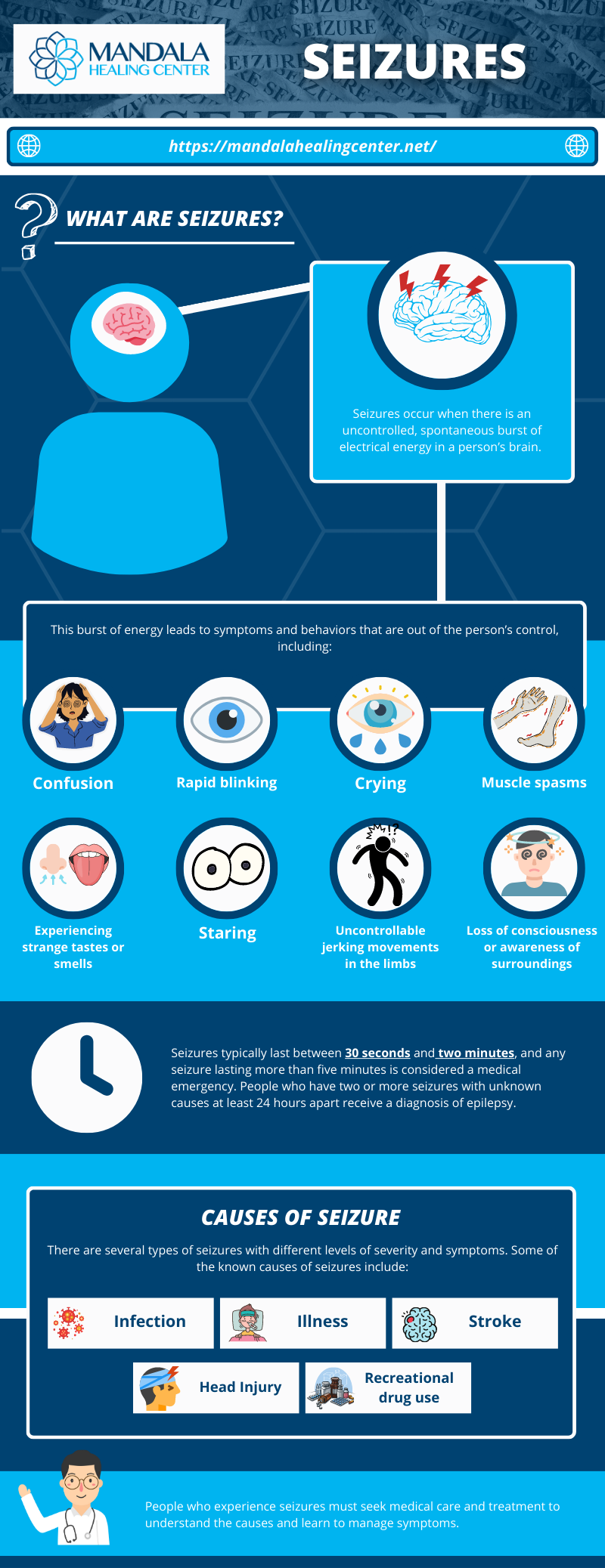Drug abuse and addiction can cause many adverse consequences to your immediate and long-term well-being. For some, using recreational drugs may cause drug-induced seizures. It’s important to understand the connection between recreational drug use and seizures and to know how to get help when you need it.
If you or someone you love requires substance abuse or addiction treatment, reach out to the caring specialists at the Mandala Healing Center now to explore your treatment options.

What Are Seizures?
Seizures occur when there is an uncontrolled, spontaneous burst of electrical energy in a person’s brain. This burst of energy leads to symptoms and behaviors that are out of the person’s control, including:[1]
- Confusion
- Rapid blinking
- Crying out
- Muscle spasms
- Experiencing strange tastes or smells
- Staring
- Uncontrollable jerking movements in the limbs
- Loss of consciousness or awareness of surroundings
Seizures typically last between 30 seconds and two minutes, and any seizure lasting more than five minutes is considered a medical emergency. People who have two or more seizures with unknown causes at least 24 hours apart receive a diagnosis of epilepsy.[2]
There are several types of seizures with different levels of severity and symptoms. Some of the known causes of seizures include:
- Infection
- Illness
- Stroke
- Head injury
- Recreational drug use
People who experience seizures must seek medical care and treatment to understand the causes and learn to manage symptoms.
Understanding Drug-Induced Seizures
Many people don’t understand the connection between recreational drug abuse and seizures. It’s essential to understand what drugs cause seizures and how to lower your risk of this potentially dangerous complication of drug abuse.
Research suggests that as many as 9% of seizures are caused by ingesting chemicals–either a poisonous substance or recreational drugs.[3] Seizures can occur when a person is going through withdrawal from a drug. Withdrawal occurs as a person’s body adapts to the sudden absence of a substance it’s dependent on and can involve uncomfortable physical and psychological symptoms.
Seizures are more common in alcohol withdrawal, but they can happen during withdrawal or while abusing several illicit recreational drugs.[4]
People with epilepsy may be more likely to experience drug-induced seizures since the drugs can trigger their epilepsy. Using drugs and alcohol can also prevent people from taking their prescription medications on time, making them more prone to seizures.
Even without a diagnosis of epilepsy, using certain recreational drugs can have adverse effects on a person’s brain and could potentially cause seizures. If someone experiences seizures from drugs, they may experience permanent brain changes that become epilepsy over time.
What Drugs Cause Seizures?
Drugs have different effects on people, but many can cause significant changes in how a person’s brain functions. Several recreational drugs are known to cause seizures or interact with prescription medications used to treat epilepsy. They include:
- Cocaine
- Benzodiazepines
- Alcohol
- Amphetamines
- Methamphetamines
- MDMA (Ecstasy)
- Opioids
- Marijuana
- Opiates
- Inhalants
- Synthetic cannabinoids
Cocaine use can trigger seizures within seconds, minutes, or hours. The drug-induced seizures caused by cocaine can be life-threatening as they can result in a fatal heart attack. For people with epilepsy, cocaine use may lower the threshold for seizure activity, meaning they may be more likely to have seizures while using the drug.
Drug-induced seizures may also occur during a drug overdose, which is a medical emergency. Seizures from drugs are more likely to occur during an overdose of stimulants, including some ADHD medications and opiates like fentanyl.
Preventing Drug-Induced Seizures
If you have epilepsy, talk to your doctor about any recreational drugs you use and get help to stop using them. If you do not have a diagnosis of epilepsy, you can still have drug-induced seizures. Seek drug abuse treatment so you can regain control of your life and health–and stop putting yourself at risk of seizures and other potentially deadly complications.
Drug-induced seizures can happen during withdrawal from some recreational drugs. If you are using drugs like cocaine, opiates, benzodiazepines, alcohol, and more, seek professional treatment to help you get through detox as safely and comfortably as possible.
During a medically-supported detox program, medical and support staff will monitor your withdrawal symptoms and provide treatment to keep you safe and comfortable. If you have drug-induced seizures, you will receive medications to control them and supervision to keep you safe.
Detoxing on your own can be nearly impossible. Withdrawal is often uncomfortable and sometimes hazardous, and most people who attempt to manage it independently fail to achieve a complete detox. Having the round-the-clock support of a medically-supervised detox center can help you have the best possible outcomes.
Find Help Now
You don’t have to live with drug or alcohol addiction. Compassionate, effective treatment is just a phone call away. Reach out to the caring team of specialists at the Mandala Healing Center now to learn about our holistic approach to addiction treatment.
Don’t just wonder about what drugs cause seizures and how to prevent them–get the information and support you need to gain control over your life and health. Call today.
References:












